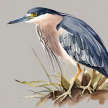The Tangible Magic of Paper Books
In an Intangible World

While e-books and audio books have become increasingly popular, I believe paper books will continue to hold an important place for many people.
Like mechanical watches and Vinyl records, after their original function and technical capability were usurped, they will continue to live on.
Clearly the digital enhancements like search, highlights, multimedia integration, and low cost along with clear environmental benefits makes print inherently inferior for most use cases.
Many of the edge cases will become significant and larger activities than previously and many of the same technologies had enable the electronic forms will also be the enablers of the growth in niche forms.
There are some key drivers for this:
Nostalgia and tradition - Reading physical books is nostalgic for many and part of long-held traditions of reading and giving books as gifts. The tactile sensation and smell of books still appeal to the senses.
Focus and retention - Studies show reading on paper leads to better focus, comprehension and retention compared to screens. The fixed layout focuses attention vs digital distractions.
Unique qualities - Paper books allow for easy note-taking, highlighting, page-flipping back to reference something, and sharing passages. The collectible and display value also persists.
Universal access - While tech gadgets come and go, books have no learning curve and work anywhere with no batteries or connectivity needed. This makes them accessible and inclusive.
Special content - Many beautifully illustrated, special editions, art books, photography collections, and children's books retain their magic best in print. The layout and visuals are optimized for print.
While e-books and audio books will take a dominant market share, as paperbacks were once the disruption to expensive hardbacks, paper books play to unique strengths of focus, tradition, display, and access that should sustain them well into the future. But they may increasingly become more specialized and premium rather than dominating the everyday consumer market.
However, the collectable, aesthetic value, and ritual use of paper books may sustain them especially for bibliophiles, gifts, art books, photography, nostalgia, children's reading and special editions. Just like vinyl records have made a comeback for their warm sound quality and album art, paper books have special sensory and design qualities.
And just as mechanical watches have survived on craftsmanship, heritage and collecting value beyond just utility, paper books will persist as objects of art, special and ritual in themselves - more than just the contents.
Within the vision of a declining volume market but increasing collector and specialty market for paper books I see an increasing sector for hobbyist/maker printed paper books. I can see some distinct possibilities emerging there:
Custom printed books as gifts - For special occasions like weddings, anniversaries, graduations etc. people may want to gift a custom printed book of photos, letters, blog posts rather than just a digital collection. The tangible book becomes a heirloom.
Self-publishing physical copies - Writers who have built a following online may want to self-publish limited edition physical runs of their works for fans who want to collect a paper version. Services like print-on-demand enable this.
Personal journals/scrapbooks - People may print out volumes of their personal blogs, travel journals, family history scrapbooks to have as collectible artifacts. May be especially meaningful to gift future generations in the family rather than just digital archives.
Fan fiction/content - Super fans may want to create printed compilations of favorite content for their fandom whether that's stories, art, meta-analysis etc. Again the printed form shows more dedication.
Nostalgic prints of favorites - Readers may want physical copies of favorite childhood books, famous classics, or impactful works to display and re-read. Even if already consumed digitally.
The hobbyist/maker market allows regular people to become "publishers" and turn sentimental digital content into custom printed artifacts. This satisfies the nostalgia and collecting value around paper books in a niche way.
Here are some more examples of book projects that may have special social or cultural value but more limited commercial viability:
Local/family histories - Compiling biographies, stories, recipes, photos of interest mostly just to family members and a local community.
Academic niche topics - Very specialized research works in humanities or sciences with a tiny target audience. But important for academic posterity.
Minority voices - Stories and perspectives from marginalized groups around identity, experiences, culture etc. May not have mass market appeal but are socially/culturally important.
Indigenous languages - Children's books or language learning materials in indigenous languages at risk of extinction like Native American tribes, Australian Aboriginal peoples, etc.
Activist works - Writings related to social/political movements and causes that a passionate minority would value but not generalized commercial interest.
Esoteric spirituality - Obscure religious and spiritual texts treasured by very small followings but largely unknown to wider culture.
Local restaurants/shops - Cookbooks, guides, and histories documenting beloved local establishments that have significance to a community.
Oral histories - Transcripts of interviews with everyday people, often elderly, with perspective on changes in society over decades.
Niche arts/crafts - Instructional manuals documenting traditional art forms, crafts, folk practices that few practice today.
Travelogues - Very localized or obscure destinations documented through photos, descriptions, maps that few would seek out commercially.
Some of these niche projects could be important to a subculture or location but difficult to sell on a mass market commercial level, however they may merit publication through grants, donations, partnerships or crowdfunding by those who value preserving and sharing them.
About the Creator
Kato Mai
I am a traveler, interested in the journey and my fellow travelers. A traveler is defined by what they are prepared to leave behind, not where they are going. My editor is AI, currently Claude, to helps me attempt flow and clarity.
Enjoyed the story? Support the Creator.
Subscribe for free to receive all their stories in your feed. You could also pledge your support or give them a one-off tip, letting them know you appreciate their work.






Comments
There are no comments for this story
Be the first to respond and start the conversation.